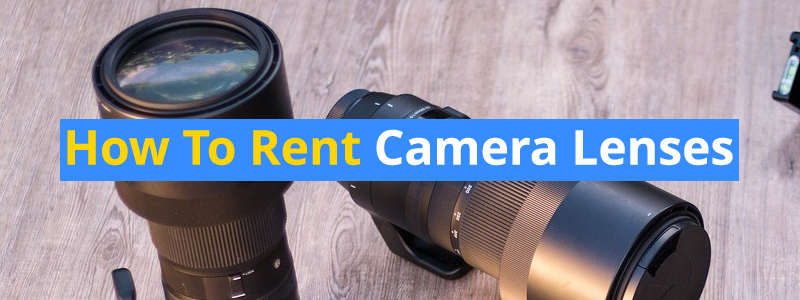How to Rent Camera Lenses
Are you going on an African or wildlife safari and need a telephoto lens for the duration of that trip? Perhaps you want to do some street photography or food photography as part of a project and need a prime lens with a low f-number? Camera lenses are one of the most important components of photography. In fact, some photography enthusiasts may even say that the choice of lens is more important than the body of the camera.
Lenses come in various forms with a diverse range of specifications. Focal length and aperture are the two main metrics. But, there are other specifications such as full frame or crop frame, focus, lightweight or heavy, build quality, image stabilization, fisheye lens, and anti-fogging which need to be looked at when selecting a lens for any photo shoot.
There are kit lenses, prime lenses, and other specialty lenses. Kit lenses are lenses that come with the camera body. They are average in quality. Prime lenses are lenses where the f-number remains constant. Then there are specialty lenses like wide angle, telephoto, etc.
The better quality prime and specialty lenses do not come cheap. They can run you up to a few hundred dollars if not a thousand and a half. Such specialty lenses are normally built for a specific type of photography. They are not your generic kit lenses which can be used in multiple environments.
Besides the high cost, there is also the issue of whether you will use those specific lenses frequently once your trip or project is over. If you don’t end up using the lens as often, then all the investment which you pour in for a good quality lens may sit idle while the lens gathers dust.
Lens rental companies have realized this problem and plugged that perceived “gap” in the market by offering short-term lens rentals. Lens rental companies allow you to select from a wide variety of lens options and the lens reaches you quite seamlessly. Before we get into the whole lens renting process, first let us understand the benefits of renting camera lenses as opposed to buying them.
Benefits of renting camera lenses
Save money
By renting the lens, you not only save money by not buying the equipment at its full price, but you also create extra cash which can then be spent on your trip. You can easily rent a lens priced at around $1200-$1500 for a few hundred dollars a week. That would free up enough money to pay for a few nights of hotel stay.
Learn and explore
Renting a lens allows a photographer to learn about a specific type of lens in a risk-free way. If someone is new to photography and does not know how to select lenses, then he/she can try out a few lens combinations to understand what kind of pictures each lens takes and where that particular lens can be used. The photographer does not have to spend a small fortune in purchasing a brand new piece only to realize later on that the lens he/she purchased is really not a fit for his/her style of photography. A 3-day rental is enough to get the “hands dirty”.
For an expert photographer, renting a lens is a great way to try out a new release. Lens manufacturers are fiercely competitive and they constantly come out with new versions of lenses. Some of these new lenses are incremental improvements on previous models, while some are technological innovations. Renting a lens allows the expert photographer to play the role of an early adopter without actually paying a premium price of a new release.
A convenient option for a business
Photography professionals and businesses can use the rental option as a cost-efficient way to take up specific kinds of projects. Photography is a complex subject and the equipment needed for every project or setting is different. It is the reason why one would see a professional photographer carry a bag full of lenses.
If a specific job calls for a specific type of lens, then by having the option of renting a lens, it is not necessary for the professional to own every single lens that is out there. Specific lens models can be rented for the duration of an event/project and then returned. The capital efficiency of the photography business goes up as it does not need to park money in expensive lenses.
Backup or fallback option
If you are working on a major project which requires fail-proof execution, then having a backup lens to your primary model is a necessity. Sometimes, a client may insist on having redundancy so that there are no hick-ups during a project. Another scenario for a backup lens could be the fact that your primary lens may be broken and out for repair. In both these cases, renting a lens can save the day for a photographer.
Travel light
Some lens rental companies tend to ship the lens to whatever US address you provide them with. Hence, if you are traveling and want to keep your bags as light as possible, then you can look at the option of renting the lens and having it shipped to your hotel or hostel. Lenses tend to be bulky pieces of equipment and renting them could enhance the logistics of your travel.
So, with all the major benefits of renting a lens listed out, let us look at the lens rental process a little more closely.
Where to rent from
There are two main types of businesses from where one can rent camera lenses. There are online businesses like Lensprotogo, Borrowlens, and Lensrentals, or one could go to an offline brick-and-mortar store. Both have their pros and cons.
Online rentals
Online rental shops have a wide variety of lenses that you can choose from. They specialize in lens rentals and hence have a large inventory from which you can pick the right lens for your purpose. Many of the online websites can even ship the lens to your travel destination if you provide them with the hotel/hostel address where you plan to stay. With offline, they may or may not do so.
Though online rentals offer choice and flexibility, they also have their fair share of risks. The first risk with online rentals is the equipment which you rented may not arrive at your doorstep in time. There is nothing more frustrating than to be ready and all set to go on a photography session only to realize that your lens will take 2 more days to arrive. The second risk is the possibility that the lens you receive from the online website might be defective or not to the level of quality that you may have expected. That could affect the quality of photos that you take using the rented lens.
Offline rentals
Offline rentals are camera chain stores like AdoramaRentals or CalumetPhotographic or your neighborhood camera store. They would either specialize in renting lenses or they would be a retailer/repair center for cameras and lenses.
Such offline stores are great if you like physically inspecting your rental lens before taking delivery of the equipment. Going to a physical location allows you to hold the lens in your hands, try it on your camera body and make sure that it is the right piece of equipment for your project. You can also avoid shipping fees for receiving the lens by mail and sending it back because you are picking up the lens in person.
The downside with offline rentals is that the variety may be limited. Brick-and-mortar stores have overheads and they can only stock a limited amount of inventory. Online stores have a central warehouse from where they can offer a large variety. Offline stores may have to order a particular model from another branch location if it is not available at the branch that you visit. All of this may take more time than the online option.
Evaluate potential rental companies
As there are multiple options to rent camera lenses from, the first question that pops up in most people’s minds is how to select the right company? There are some key features that you should research to shortlist a few companies.
- Price: Whether you pick an online or offline company to rent from, make sure you do a price compare. You would want to compare 3-day, 4-day, 1-week, 2-week rates, or check whatever duration you plan to rent the lens for. Also, check all the other services that the rental company offers to its customers.
- What is included in the fee: Make sure you clarify what the shipping fees are and whether the shipping includes the return shipping label as well.
- Insurance requirements: Check the company’s requirements regarding insurance. Sometimes, rental companies insist that you hold a certificate of insurance.
- Quality control: Check their policy on how old their equipment is. Many rental companies have a thumb rule of stocking equipment only for a certain number of years before selling it off. It is also important to understand the checking process or quality control procedure of the company. Does it test the lens before packing and shipping it to you? You wouldn’t want to receive a lens that is scratched or has something stuck to the glass. That will lead to time wastage in you waiting for a replacement.
- General professionalism: Try to work with a reputed firm that has a history of being in the rentals business. Speak to the company’s customer service to get an idea of how responsive the company is and use the opportunity to ask any details that are not clear in the information on the website.
Selecting the right lens
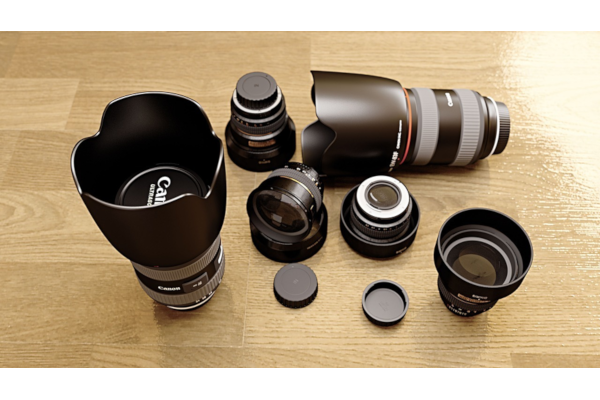
Once you have picked the company from where to rent, the next step is to figure out which lens to rent. For that, you first have to understand the environment in which you plan to use the lens. Is it an event with moving people like a wedding? In such cases, you need a fast focus. Is it a sports event or a kids soccer tournament? In that case, you need a fast lens with image stabilization. Zoom function will be important as well if you are going to be seated far away from the action.
If you plan to travel at a scenic destination, then you probably will do landscape photography where a high f-number will suffice. Indoor photography with a prime lens is another ballgame altogether. So, you need to understand what kind of aperture, shutter speed, and ISO you will be working with. Study these topics if you are a beginner. There is no point in spending money on rental fees and then realizing that the lens which you opted for is a complete mismatch for the environment in which you plan to use it.
Find the lens at your preferred vendor
Once you know the lens that you need and have shortlisted rental companies that you want to rent from, the next step would be to find the selected lens at those shortlisted companies. You would want to make sure that your selected equipment is in stock at the rental company and available during the dates which you have planned for.
You will also want to run a price compare and compare any additional features or services that the rental companies offer. Ultimately, you are looking for the best overall package in terms of rental fee, shipping, insurance, accessories, etc.
Place the order
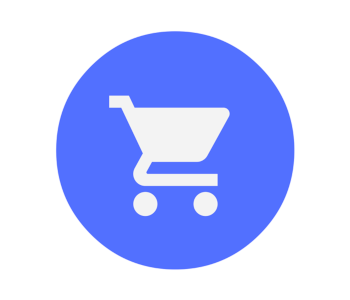
After selecting the lens (either on the website or in person at a physical store), you need to select the dates for the rental duration. It is always advisable to rent the camera lens for a day or two longer than your planned shoot dates. You never know when bad weather hits the location where you are taking pictures and it forces you to wait for a day or two.
While placing the order, you may be given the option of purchasing a damage waiver. A damage waiver is like an insurance policy which reduces your responsibility for any damage to the lens to a small percentage of the replacement value. Normally, your liability gets limited to something like 15% of the replacement cost. If you do not opt for the damage waiver, then you are liable to pay the entire cost of a new lens in the case that it gets damaged by you.
In addition to damage waiver, some companies also require you to have a certificate of insurance. This basically means that if the rented lens gets stolen or misplaced at your photo shoot venue, then the rental company gets cover for that risk.
Make the payment
After selecting your lens, insurance/waiver options, and any accessories that you may want to go along with your lens, you will make the payment. Your credit card normally does not get charged right away. Most rental companies count the fees from the day the first attempt for delivery is made. So, if the attempt is successful and you have the lens in your hands, the rental fee kicks in from that day onwards.
Check carefully upon receiving the lens
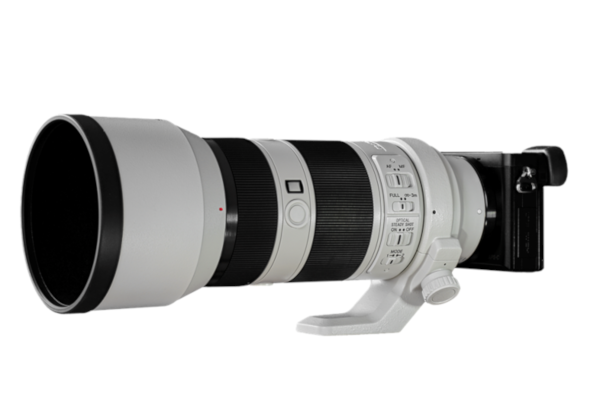
As soon as you receive your rental lens, make sure you check everything. Examine if anything is damaged or if any component/accessory that you ordered is missing. If that is the case, immediately inform the rental company.
After a physical inspection, put the lens on the camera body and take a couple of test pictures to make sure that the quality and functioning of the lens is good. Again, if something isn’t right, do not wait. Contact and rental company and inform them. Normally, the rental companies have a rule that any damage/functioning issue must be brought up within 24 hours of receiving delivery.
If you are picking up the lens from an offline location, make sure you check the equipment thoroughly before taking possession of the lens. Take some pictures at the store if you have to. Get everything sorted at the store itself. Opting for an offline rental company gives you the benefit of personal inspection of the lens.
Return the lens at the end of your rental period
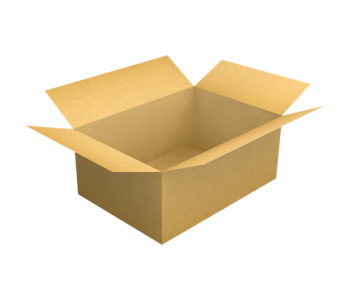
Once you are done using the lens and once your rental period ends, you will have to ship back the lens to the rental company. The lens has to be packed with any other accessory that came with the lens. Be it hoods and cases, whatever comes to you must be returned back.
After you put all the equipment in the box and tape it up, you will have to stick a return shipment label which the rental company will most likely provide you when they send you the equipment. Make sure you clarify that the return shipping is included in the fees that the rental company charges you.
Late fees or extensions
If for some reason, you need to extend your rental period, then you can do so in most cases upon paying an additional rental fee. The additional fee that you pay depends on how soon or how far in advance you inform the rental company about the extension. If you do it before the end of your rental period, then it costs lesser. If you inform the rental company after your rental period has ended, then the charges are higher.
So, by reading this guide, you will now have a solid understanding of the lens rental process. You can now go out and rent lenses without any hassles. Good luck with your photography!

